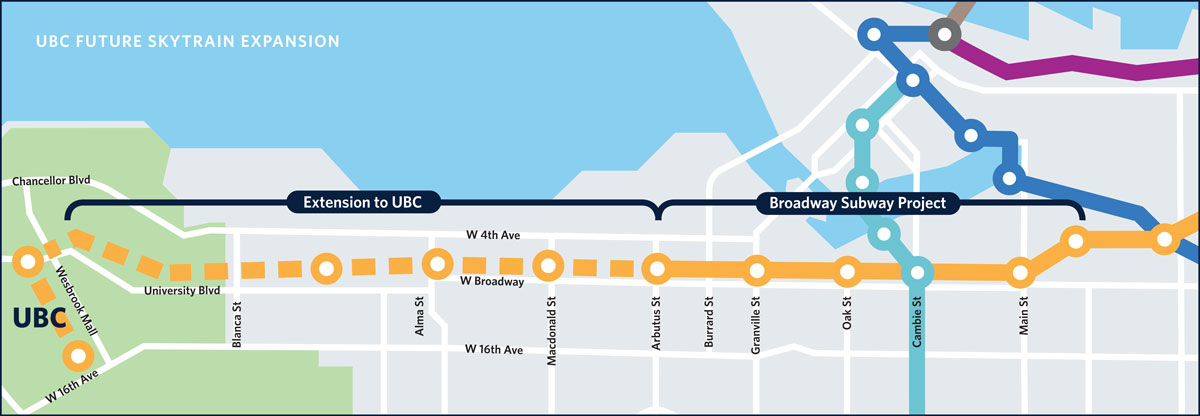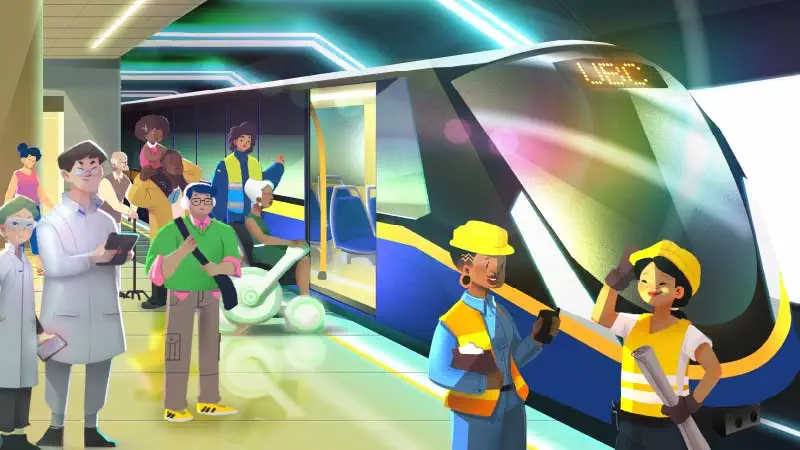
Next station is: higher education or housing cost?
On the coast of Vancouver lies a small community of families and young adults, isolated from the city’s SkyTrain line. UBC’s lack of time-efficient transport disconnects its residents from the rest of metro Vancouver. Despite years of promises, one question remains: Is a SkyTrain to UBC even possible?
 Illustration of the UBC Extension line (UBC Rapid Transit, 2024)
Illustration of the UBC Extension line (UBC Rapid Transit, 2024)
A SkyTrain to UBC has been a part of the big picture of the Broadway Subject Project, with the current Broadway Subway Project to Arbutus serving as phase one, according to the TransLink webpage on the project. The importance of this extension to UBC can be seen with the 99 B-Line, one of UBC’s main bus connectors to the city and Canada’s busiest bus route. In addition, the project is closely related to the approved 90-acre Jericho Land Project, with both projects having a positively intertwined relationship. Connecting UBC to Vancouver cuts travel time, providing students and faculties more access to housing and the general public to higher education, job opportunities, and cultural hot spots!
During the October 2024 election, the BC NDP’s campaign promised to continue the project, building on previous endorsements from the Mayor’s Council and Vancouver’s City Council in 2019. Elected Premier David Eby has since directed Transportation Minister Mike Farnworth in a mandate letter to lead the next step and fulfill “…commitments we have made to British Columbian.”
“Lead work to advance progress on the Broadway extension to UBC, including by working with the federal government, UBC, the City of Vancouver, First Nations, and all relevant government agency stakeholders.”
Premier Eby’s mandate letter to Minister Farnworth
Since 2021, the federal government has promised to fund up to 40% of the cost of the UBC line’s Business Case, followed by then-BC Premier John Horgan's provincial government, which pledged another 40%. In addition to the government contribution, UBC’s Board of Governors has shown interest in making financial contributions.
 An illustration of the potential UBC station:TransLink
An illustration of the potential UBC station:TransLink
Despite the promising aspects of most of the cost being covered and government backing, there are still doubts about the building of the station.
Although planning progress has been made in recent talks, including the Mayors’ Council’s 2022 endorsement of station locations on Macdonald, Alma, Jericho, and UBC, no firm construction timeline has yet to be revealed. The most recent update on the project comes from Premier Eby’s mandate letter assigning Minister Farnworth a Parliamentary Secretary to help advance the project. The current Broadway Subway to Arbutus won't open until 2027, pushing any UBC extension completion well into the 2030s.
A 2019 TransLink report estimated the Arbutus-UBC SkyTrain extension would cost $3.3-3.8 billion (pre-inflation). While SkyTrain could serve 130,000 daily riders by 2050, UBC Sustainable Urban Design Professor Patrick Condon offers alternatives. His 2008 study suggests another transportation mode, tram lines. The reason for his argument? A Translink investment of same price could build 175 km of tram lines. Portland's model shows trams stimulate neighbourhood development with lower construction emissions. Though slower, trams require less infrastructure and offer more stops, potentially achieving greater greenhouse gas reductions through transit-oriented development rather than just mode shift.
Despite the promise of helping UBC residents and students with more affordable housing choices, Professor Condon further argues that SkyTrain will increase housing prices by developing luxury condos along the trail, in the likes of Oakridge, in a 2019 article for The Tyee. Economic uncertainties and affordability concerns can create complex dynamics where transit improvements could create new challenges without proper planning.
The UBC SkyTrain extension is possible in all technicalities, with sure financial support and a concrete plan. Is the UBC line a not-so-distant dream, or should Vancity consider other solutions that would be better suited for the crowded and constantly developing campus?
Get the latest news and stories delivered to your inbox.